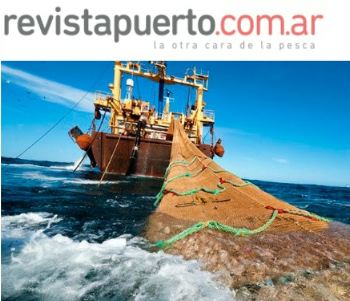|

Image: Revista Puerto / FIS
´The Blue Hole (Agujero Azul) MPA triggers the possibility of an MPA in international waters´
 ARGENTINA
ARGENTINA
Wednesday, March 29, 2023, 03:00 (GMT + 9)
The recent UN Oceans Agreement allows the designation of Marine Protected Areas outside 200 miles, but Milko Schvartzman assures that if Congresswoman Graciela Camaño's proposal were to prosper, we would lose the support of the international community because it would affect an area in dispute over sovereignty.
.jpg) We spoke with the specialist in Illegal, Unreported, Unregulated (IUU) Fishing Milko Schvartzman about the scope of the recent agreement concluded at the UN on Oceans and the tools that it gives our country to act against the fleet that operates at Mile 201 in the South Atlantic. The interviewee assures that if the Agujero Azul AMP becomes law, it will have a very negative impact because it could only be applied to the national fleet, but, in addition, it would prevent progress in the creation of an AMP in international waters, since it affects disputed areas of sovereignty, which contradicts the spirit of the agreement. We spoke with the specialist in Illegal, Unreported, Unregulated (IUU) Fishing Milko Schvartzman about the scope of the recent agreement concluded at the UN on Oceans and the tools that it gives our country to act against the fleet that operates at Mile 201 in the South Atlantic. The interviewee assures that if the Agujero Azul AMP becomes law, it will have a very negative impact because it could only be applied to the national fleet, but, in addition, it would prevent progress in the creation of an AMP in international waters, since it affects disputed areas of sovereignty, which contradicts the spirit of the agreement.
REVISTA PUERTO: How important is the Oceans agreement in terms of fishing in Mile 201?
MILKO SCHVARTZMAN: The agreement is to be celebrated, but it is a piece and we will have to continue rowing, within this agreement and other agreements. The first frustration with this agreement was that when negotiations began, fishing was left out due to pressure from Norway, Iceland, China and Japan. In 2015 it was only decided to make an agreement because until then it was discussed whether or not there would be an agreement, but without fishing it was already born as a rather devalued agreement, because it is the largest exploitation activity in international waters. It is also important because although it does not include fishing specifically, in one of the four legs that it has, that of environmental impact studies allows evaluating the impact that fishing generates on the environment, which will allow finding ways to restrict the activity through, for example, Marine Protected Areas, which is another leg of the agreement.
RP: Are MPAs generated through Regional Fisheries Management Organizations?
MS: No, the MPAs are managed within the agreement, they do not go through RFMOs.

Image: argentina.gob.ar / Wiki / FIS
RP: So, is there any possibility for Argentina to propose an MPA at Mile 201 without affecting the discussions on the sovereignty of the Malvinas (Falklands)?
MS: It is important to highlight that the agreement clarifies that MPAs will not be allowed to be established in disputed areas or sovereignty claims. The same agreement opposes the creation of MPAs such as Agujero Azul, which, although it is a platform MPA, is from a disputed platform and goes against the spirit of the agreement. This agreement says that Agujero Azul is an unfeasible MPA. It is very interesting for us because an MPA is being proposed, which those who defend it say will allow progress in an MPA in international waters, in the water column, and this agreement makes it clear that it will not be possible. It also clarifies that, if an MPA is going to be created in the continental zone of a country, because the water column is international and the platform is national, it must have the participation and approval of the coastal country, this means that we are not going to to impose anything, as some think.
RP: What would moving forward with designating the Agujero Azul MPA imply?
MS: It would detonate any possibility that Argentina could advance in the designation of a legitimate MPA in international waters through this agreement, because Agujero Azul affects a disputed area. Therefore, it will not have any support from the international community because we would have an illegitimate MPA. The spirit of the agreement is the creation of MPAs without the intention of advancing on sovereignty disputes and the objective of the Agujero Azul MPA is that.

Foreign fleet over mile 201. Source . Photo: Milko Schvartzman
RP: So if the Agujero Azul MPA prospers, it would not only make it impossible for us to think of an MPA in international waters, but would it be exclusively applicable to the Argentine fleet?
MS: That's right, only on the Argentine fleet, because half of the AMP is located in an area not recognized by the United Nations as Argentine property and cannot exercise governance. That is why there are many NGOs that do not support this proposal. I am against this AMP because of the format, because of the errors in its wording, for two years they confused east with west, it has no legal basis, it did not go through a democratic debate process and it violates the Escazú Agreement. It is an AMP that was born in darkness and continued to advance in that area. But I do not disagree with the AMP, nor against the organizations that promote it, but given this agreement in which Argentina participated for 10 years and signed it until China makes it clear that progress should not continue, because it is in against everything that has been worked. I hope you reflect because your designation will not allow us to advance in an AMP that really works.
RP: What MPA does the agreement allow us to think about to stop fishing at Mile 201?
MS: If it does not move forward with Agujero Azul, Argentina can move forward, either individually or in alliance with other countries, and present an MPA proposal within this new body that the agreement creates. This body called the Conference of the Parties allows the creation of MPAs through consensus or by voting. One could think of protecting the Blue Hole from the entire fleet in international waters and it would be much more effective. We should already be working on that today, I am going to be the first to present an MPA proposal for Argentina in this organization, summoning all the actors because the Argentine Sea is the patrimony of all Argentines and the international waters of humanity.
RP: Could Argentina request environmental impact studies on the activity carried out by the foreign fleet in adjacent waters?
MS: Argentina not only could, but should require those who operate that fleet, the responsible countries, to carry out environmental impact studies. This agreement may have implications that are much greater than creating an MPA.
RP: Is it defined how and who will carry out these studies?
MS: The agreement says that national states must do it, but complying with their national standards and certain minimum parameters. I think that some rigor must have. It is a small step forward, this possibility we did not have before.

Photo: Círculo de Políticas Ambientales / FIS
RP: Are the tools provided by this agreement more important than those provided by the agreement to remove subsidies from the WTO?
MS: Today I think that the agreement that is going to have a more direct and verifiable implication is that of the WTO because it is going to cut off the tap to a part of this fleet and it is going to mean fewer ships in the water. This agreement prohibits subsidies to fleets that fish in unregulated areas, not just illegal ones.
RP: Is Argentina working to take advantage of this tool?
MS: Argentina should be looking for a solution that does not involve the question of sovereignty, but if we don't look for it, we won't find it. I think a commission for the conservation of the resources of the South Atlantic should be formed. We are going to have to look for something because now it is not being done and at some point it will be too late, the fleet is increasing and more and more fishing effort is required for the same catch. We are seeing that Argentine jiggers are complaining because they are not having good catches... At some point the ecosystem is going to take its toll on us and that is going to generate a crisis, not only environmental but also social and economic. We still have time to propose something, to work with other countries on a solution without implying the cession of sovereignty.

Related News:




.jpg)

[email protected]
www.seafood.media
|



